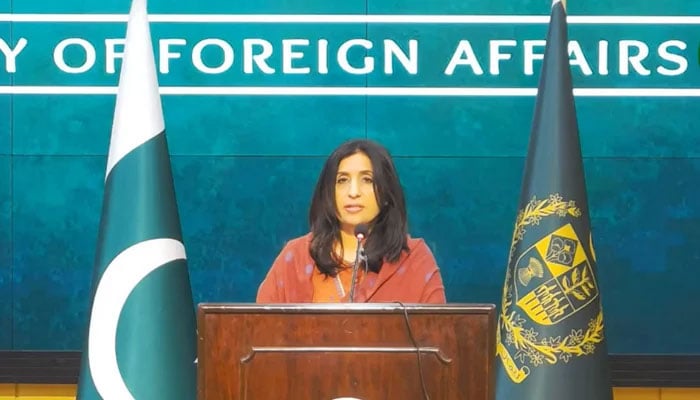India yet to inform us about attending SCO summit: FO
"I’m not aware of any communication from Indian government," FO spokesperson said
ISLAMABAD: India has still not communicated to Pakistan whether Prime Minister Modi will attend the Shanghai Cooperation Organization summit being held next month in Islamabad or if he will be represented by a nominee.
The issue was raised at the Foreign Office briefing on Thursday to which the spokeswoman responded, “Prime Minister of Pakistan has extended invitations to the heads of government of all SCO member states. At this point, I’m not aware of any communication from the Indian government regarding their representation. Secondly, Pakistan takes its responsibility as the host of SCO heads of government meeting very seriously. And in that respect, all arrangements are being made for smooth holding of the conference, including all security arrangements.”
An announcement by Chief Minister, Khyber Pukhtunkhwa, that he will hold talks directly with the Taliban and visit Afghanistan in regard to continued terrorist attacks from the western border, the spokeswoman affirmed that foreign policy is a federal subject and secondly, it is the prerogative of the Government of Pakistan to pursue its foreign policy. “Any proposals which come from any public figure in Pakistan will be considered by the Government of Pakistan and decisions will be taken in Pakistan’s national interest,” she said.
In this regard, she pointed out that Pakistani officials and Pakistani nationals can visit any foreign country as private individuals and the Government of Pakistan does not provide them directions when they undertake these private visits. “When such a proposal comes before the Ministry of Foreign Affairs, we would be able to comment on them,” she said.
In her opening remarks, the spokeswoman pointed out that Pakistan condemned the recent decision by the Delhi High Court to uphold the Indian decision to proscribe several political parties, advocating the rights of Kashmiri people. “Banning of indigenous political parties is part of India’s relentless campaign to subjugate the Kashmiri people, stifle dissent and consolidate its occupation of Indian Illegally Occupied Jammu and Kashmir (IIOJK). Parties that advocate the rights of the people of Jammu and Kashmir are being silenced under the Unlawful Activities (Prevention) Act (UAPA), a law that has increasingly been used as a tool for repression of the Kashmiri people,” she said. As Afghanistan announced that work on the TAPI project would start soon from Afghanistan, the spokeswoman reaffirmed that the TAPI project is important for the energy security of Pakistan. “It is an important project that offers numerous opportunities for our region. Pakistan will continue to work with its partners for development of the project. We have noted this development. The recent development is being evaluated by the department concerned. Pakistan remains committed to the project,” she said without giving details.
A query was raised about the problems that Pakistani journalists were facing to acquire a US visa to cover the coming elections with several obstacles being put by the US Embassy. “We are in communication with the US Embassy, which has assured us that private journalists interested in visiting the United States do not require official sanction or notes from the Ministry of Foreign Affairs. We remain engaged with them and any cases that are brought to our notice of visa officials seeking such communications are being brought to the notice of the US Embassy,” she explained.
-
 Dax Shepard Describes 'peaceful' Feeling During Near-fatal Crash
Dax Shepard Describes 'peaceful' Feeling During Near-fatal Crash -
 Steve Martin Says THIS Film Has His Most Funny Scene
Steve Martin Says THIS Film Has His Most Funny Scene -
 Kensington Palace Shares Update As Prince William Continues Saudi Arabia Visit
Kensington Palace Shares Update As Prince William Continues Saudi Arabia Visit -
 Fugitive Crypto Scammer Jailed For 20 Years In $73m Global Fraud
Fugitive Crypto Scammer Jailed For 20 Years In $73m Global Fraud -
 Will Andrew Mountbatten-Windsor Finally Go To Jail Now That King Charles Has Spoken Out? Expert Answers
Will Andrew Mountbatten-Windsor Finally Go To Jail Now That King Charles Has Spoken Out? Expert Answers -
 Melissa McCarthy Reveals Her Tried And Tested ‘corpse’ Night Time Routine That’s Lost Her 95lbs
Melissa McCarthy Reveals Her Tried And Tested ‘corpse’ Night Time Routine That’s Lost Her 95lbs -
 Horrifying Pictures Of The Kidnapper Of Savannah Guthrie's Mother Released
Horrifying Pictures Of The Kidnapper Of Savannah Guthrie's Mother Released -
 Andrew's Ex-girlfriend Launches Brazen Attack On Epstein Victims On Piers Morgan Show
Andrew's Ex-girlfriend Launches Brazen Attack On Epstein Victims On Piers Morgan Show -
 Andrew Mountbatten-Windsor 'on His Own' As Palace Gives Green Light To Law Enforcement
Andrew Mountbatten-Windsor 'on His Own' As Palace Gives Green Light To Law Enforcement -
 Kanye West's Tweet About Super Bowl Halftime Resurfaced After Bad Bunny's Show
Kanye West's Tweet About Super Bowl Halftime Resurfaced After Bad Bunny's Show -
 'FBI' Star Juliana Aidén Martinez Tease Her Return To 'Law And Order: SVU' After Quitting
'FBI' Star Juliana Aidén Martinez Tease Her Return To 'Law And Order: SVU' After Quitting -
 Cardi B's Emotional Words To Pal Amid Stefon Diggs Rumored Breakup Revealed
Cardi B's Emotional Words To Pal Amid Stefon Diggs Rumored Breakup Revealed -
 Princess Eugenie Breaks Cover Amid Explosive Family Scandal
Princess Eugenie Breaks Cover Amid Explosive Family Scandal -
 Will Kate And Anthony Have 'Bridgerton' Spin Off? Revealed
Will Kate And Anthony Have 'Bridgerton' Spin Off? Revealed -
 Schoolgirl Eaten Alive By Pigs After Brutal Assault By Farmworker
Schoolgirl Eaten Alive By Pigs After Brutal Assault By Farmworker -
 King Charles’ Statement About Epstein Carries A Secret Meaning: Here’s Why It Can Be An Invite To Police
King Charles’ Statement About Epstein Carries A Secret Meaning: Here’s Why It Can Be An Invite To Police




